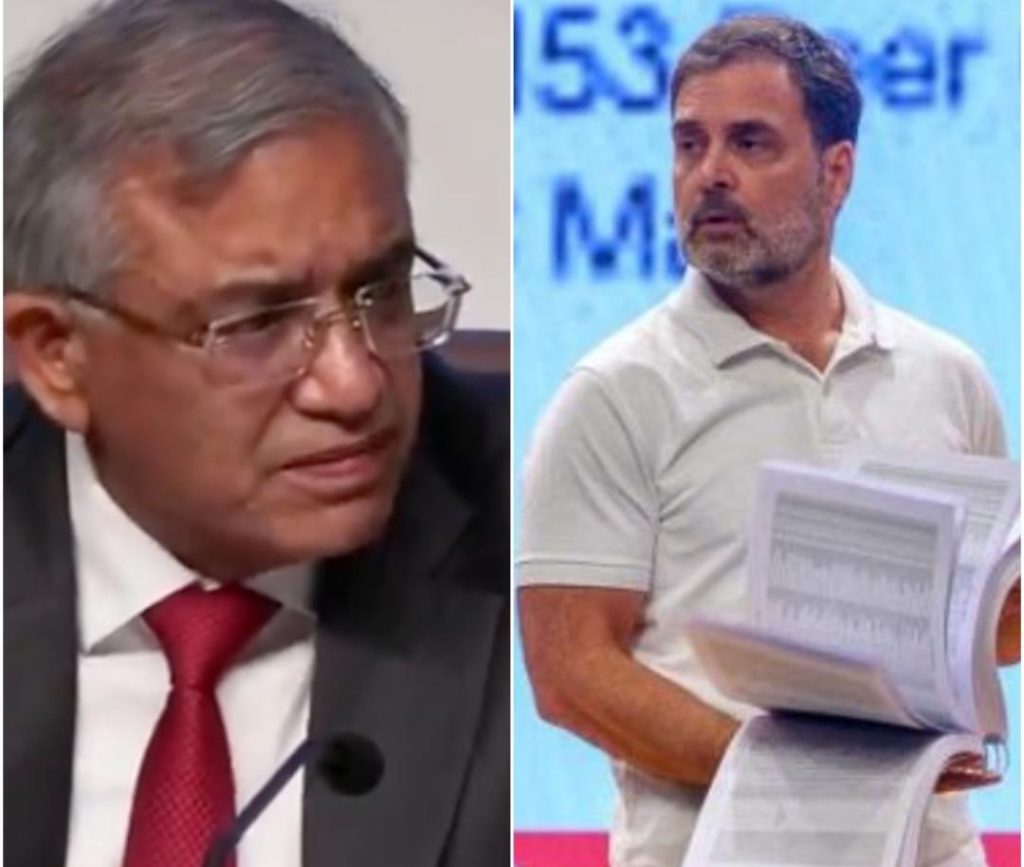
Vote Chori’ Phrase an Insult; Should We Share CCTV Footage of Mothers & Sisters Voting?: EC
The ongoing election season in India has been marred by allegations of rigging and manipulation by various political parties. The latest development in this saga is the controversy surrounding the phrase “vote chori” (vote theft), used by Congress leader Rahul Gandhi to claim that the elections are rigged. In response, Chief Election Commissioner (CEC) Gyanesh Kumar has criticized the phrase, calling it an insult to the Constitution. Furthermore, he has also raised concerns about the demand for sharing surveillance footage from polling booths, particularly of mothers and sisters voting.
The phrase “vote chori” has been a hot topic of discussion in recent times, with many politicians and citizens alike using it to express their frustration and distrust in the electoral process. However, the CEC has taken a strong stance against the usage of this phrase, terming it as an insult to the Constitution and the democratic process. In an interview, Kumar stated, “The phrase ‘vote chori’ is an insult to the Constitution and the democratic process. It’s an attempt to create distrust and disillusionment among the people.”
The CEC’s criticism of the phrase is not unfounded. The phrase “vote chori” has been used to create a sense of fear and mistrust among the electorate, implying that the elections are rigged and that votes are being stolen. This can lead to a breakdown in faith in the electoral process and undermine the very fabric of democracy. Furthermore, the usage of this phrase can also be seen as an attempt to create divisions and polarize society, which can have long-term consequences for the country.
However, the CEC’s criticism of the phrase has not been without controversy. Many have argued that the phrase is a legitimate expression of frustration and concern about the electoral process. They argue that the CEC is being overly sensitive and that the phrase is not intended to create distrust or undermine faith in democracy.
In addition to the controversy surrounding the phrase “vote chori,” there is also the issue of releasing surveillance footage from polling booths. Many have demanded that the Election Commission share CCTV footage of voters, including mothers and sisters, to prove that the elections are fair and transparent. However, the CEC has raised concerns about the privacy and security of voters, stating that sharing such footage could compromise their privacy and put them at risk.
In an interview, Kumar stated, “Should the Election Commission share the CCTV videos of any voter, including their mothers, daughters-in-law? We don’t think so. We have to ensure the privacy and security of voters.” He continued, “We are committed to transparency, but we also have to ensure that the privacy of voters is protected.”
The CEC’s concerns about privacy and security are not unfounded. In today’s digital age, there is a risk of data breaches and unauthorized access to personal information. Sharing CCTV footage of voters could compromise their privacy and put them at risk of cyber attacks or other forms of harassment.
Furthermore, sharing CCTV footage of voters could also have unintended consequences. For example, it could lead to the identification and intimidation of voters who may have voted differently than the majority. This could have a chilling effect on the electoral process and undermine the very principle of democracy.
In conclusion, the controversy surrounding the phrase “vote chori” and the demand for sharing surveillance footage from polling booths highlights the delicate balance between transparency and privacy in the electoral process. While it is essential to ensure the transparency and fairness of elections, it is also crucial to protect the privacy and security of voters.
The CEC’s criticism of the phrase “vote chori” is a welcome development, as it highlights the importance of preserving the integrity of the democratic process. However, the demand for sharing CCTV footage of voters is a more complex issue that requires careful consideration and balancing of competing interests.
Ultimately, the Election Commission must strike a balance between transparency and privacy to ensure that the electoral process is both fair and secure. The CEC’s stance on this issue is a step in the right direction, and it is essential that all stakeholders work together to ensure the integrity and transparency of the electoral process.






